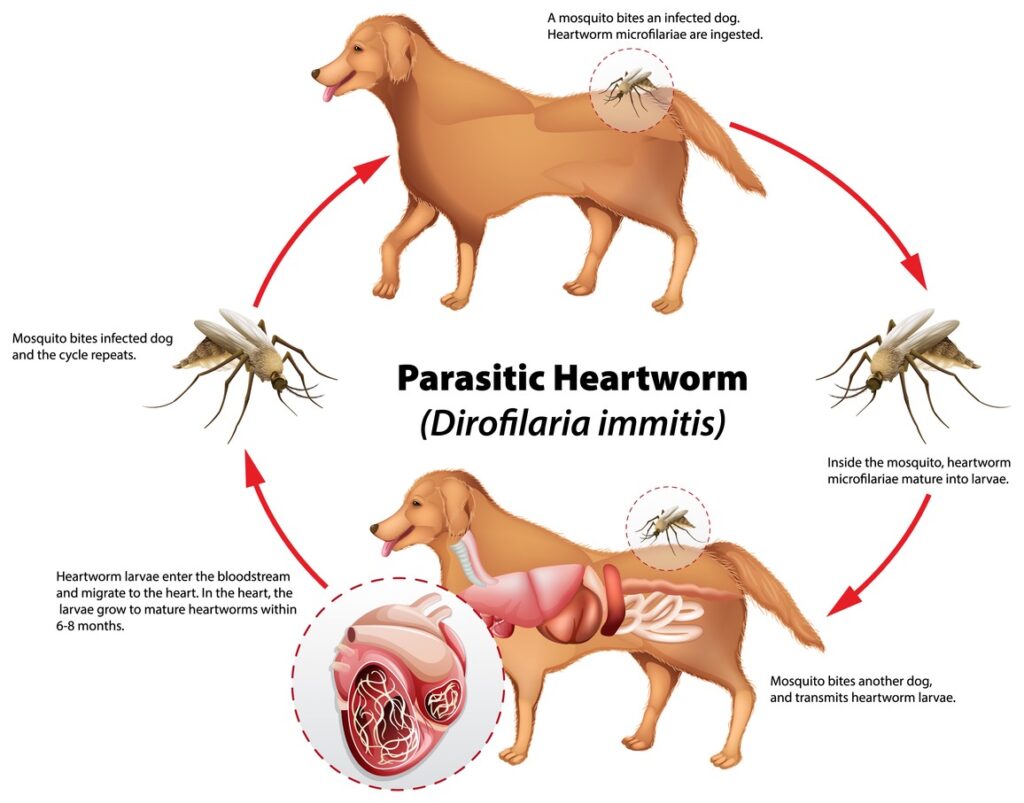Heartworm disease is a severe and potentially fatal condition, and what’s even more alarming is that it often goes unnoticed until it’s in its advanced stages.
Microscopic worms transmitted through mosquito bites cause heartworm disease. Once infected, these worms can grow up to a foot long and take residence in the heart and lungs of dogs, cats, and even ferrets. The symptoms may be subtle initially, but pets can suffer from extreme conditions as the disease progresses. Left untreated, it can lead to heart failure, organ damage, and, ultimately, death.
This blog will give you the facts about heartworm disease, its symptoms, treatment, and, most importantly, how to prevent it. Don’t let the silent killer destroy your furry friend’s happy and healthy life. Stay tuned!
What is Heartworm Disease?
Tiny worms transmitted to pets through the bite of a female mosquito cause heartworm disease. These worms have a complex lifecycle involving multiple development stages within both the mosquito and the host animal.
The lifecycle of heartworms

The life cycle of a heartworm involves five stages:
- Mosquito Infection: It starts when a female mosquito bites an infected animal (usually a dog or a wild animal like a coyote or fox) carrying microscopic baby heartworms, called microfilariae, in its blood.
- Development of Heartworms in the Mosquito: Inside the mosquito, these baby heartworms mature into larvae over a period of about 10 to 14 days.
- Transmission: When the infected mosquito bites another animal, it injects these larvae into the animal’s bloodstream.
- Migration to Heart and Lungs: The larvae travel through the infected animal’s bloodstream until they reach the heart and lungs. There, they grow into adult worms over several months.
- Mating and Production of Microfilariae: Once matured, the adult worms mate and produce microfilariae, which circulate in the infected animal’s bloodstream, completing one cycle.
Symptoms and Signs of Heartworm Disease in Pets
The symptoms of heartworm disease can vary depending on the infection’s severity and the animal’s species. In the early stages, pets may exhibit subtle signs such as a mild cough or fatigue. This disease is often referred to as the “silent killer” because in its early stages, it often shows no symptoms or only very subtle ones. Dogs and cats infected with heartworms may not exhibit any signs until the disease has progressed to a more advanced stage. By this time, significant damage may have already occurred to the heart, lungs, and other organs.
As the disease progresses, the symptoms become more pronounced and can include:
- Coughing
- Difficulty breathing
- Decreased appetite
- Weight loss
- Fainting
Diagnosis and Testing for Heartworm Disease
Early detection of heartworm disease is crucial for successful treatment and prevention of further complications. We typically perform a series of tests to diagnose heartworm disease, including a blood test that detects the presence of adult heartworms or their offspring. Imaging techniques like X-rays or ultrasounds can tell us the extent of the infection.
Treatment Options for Heartworm Disease
Treating heartworm disease can be complex and lengthy, especially in advanced cases. The goal of treatment is to eliminate adult worms and prevent further damage to the heart and lungs. Treatment typically involves a combination of medication, rest, and close monitoring by one of our veterinarians. In severe cases, surgery may be necessary to remove the worms from the heart and blood vessels.
Heartworm Cases in Los Angeles County
According to the LA Country Department of Health, three drought-resistant species of mosquitoes that may transmit heartworm have been spreading in LA County in the past decade: The Asian Tiger Mosquito, the Australian Backyard Mosquito, and the Yellow Fever Mosquito. Between 2012-2021, veterinarians in Los Angeles County reported 604 cases – in 24 cats and 580 dogs. The majority of the cases (80%) had no symptoms at the time they were diagnosed.
Prevention and Proactive Measures Against Heartworm Disease
Prevention is always better than cure when it comes to heartworm disease. There are several options available for preventing heartworm infection, including monthly preventive medication and yearly testing. Your Cinema Vet veterinarian can recommend the most suitable preventive measures based on your pet’s lifestyle, risk factors, and overall health. It’s important to follow the prescribed preventive regimen consistently to ensure your pet’s protection.
The Importance of Regular Veterinary Check-Ups
Regular veterinary check-ups are essential for maintaining your pet’s overall health and well-being, including protection against heartworm disease. During these visits, your veterinarian can perform routine screenings for heartworm infection, assess your pet’s overall health, and provide guidance on preventive measures. They can also address any concerns or questions regarding heartworm disease or other potential health issues.
Our Annual Exam Package includes the wellness exam, a fecal test, and a heartworm test. Both of these tests are recommended yearly to help prevent the spread of disease!
Common Misconceptions About Heartworm Disease
There are misconceptions surrounding heartworm disease that can lead to complacency and put pets at risk.
- One common misconception is that indoor pets are not susceptible to heartworm infection. However, mosquitoes can still find their way indoors, and all it takes is one bite to transmit the disease.
- Another misconception is that heartworm disease only affects dogs. While dogs are more commonly affected, cats and ferrets can also contract heartworm disease, and the consequences can be just as severe.
Heartworm Disease and Its Impact on Pet Health and Well-Being
Heartworm disease can significantly impact your pet’s health and overall well-being. As the worms multiply and grow within the heart and lungs, they cause inflammation, damage to blood vessels, and disruption of normal blood flow. If left untreated, this can lead to heart failure, organ damage, and, ultimately, death. Treating advanced cases of heartworm disease can be challenging and costly, and it may not always guarantee a full recovery. Therefore, prevention is crucial in ensuring your pet’s long and healthy life.
Conclusion: Protecting Your Pets from Heartworm Disease
Heartworm disease is a silent killer that can have devastating consequences for your beloved pets. By understanding the disease, its transmission, symptoms, and treatment options, you can take proactive measures to protect your furry friends. Regular veterinary check-ups, consistent preventive medication, and minimizing mosquito exposure are essential in preventing heartworm infection. Remember, prevention is critical in keeping your pets safe and ensuring they live a happy and healthy life free from the dangers of heartworm disease.
So, take action today and prioritize your pets’ well-being by staying vigilant and informed about heartworm disease. Together, we can keep your furry friends safe from this silent killer.
Warm regards,
Your Team at
Cinema Veterinary Centre

